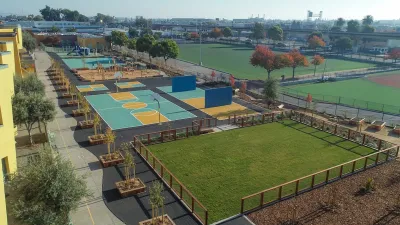Anna Leidreiter explores the ecological principles underlying Oakland's dramatically successful waste reduction program, and echoes the refrain that modern cities must think about consumption and waste in cyclical terms.
Central to any truly meaningful, sustainable urban sanitation program is an intimate understanding of ecosystems. To the natural world, there is no such thing as waste; as Leidreiter explains, "all wastes produced are converted into nutrients for future growth." And while clean energy often takes center stage in discussions of sustainability, finding ways to integrate ecological cycles into urban waste policy is just as critical.
To make that shift on an urban scale requires a holistic approach: just as those managing waste must consider its origin, those creating raw materials and refined products must consider their ultimate destination. These principles laid the foundation of the City of Oakland's waste reduction program, which began in 2006 with the adoption of a simple goal: zero waste by 2020.
In the first four years of the program, Oakland cut its annual landfill input by almost 30 percent – from 400,000 tons per year down to 291,000. The introduction of a composting program for organic material (food scraps and yard waste) alone led much of the progress: in 2008, organic material accounted for 48 percent of all garbage destined for Oakland's landfills.
Leidreiter notes that the program moves forward in "logical increments": "(1) improving downstream reuse and recycling of end-of-life products and materials, (2) pursuing upstream re-design strategies to reduce the volume and toxicity of discarded products and materials and promote low-impact lifestyles, and (3) fostering and supporting the use of discarded products and materials to stimulate and drive local economic and workforce development."
FULL STORY: Circular metabolism: turning regenerative cities into reality

Alabama: Trump Terminates Settlements for Black Communities Harmed By Raw Sewage
Trump deemed the landmark civil rights agreement “illegal DEI and environmental justice policy.”

Planetizen Federal Action Tracker
A weekly monitor of how Trump’s orders and actions are impacting planners and planning in America.

The 120 Year Old Tiny Home Villages That Sheltered San Francisco’s Earthquake Refugees
More than a century ago, San Francisco mobilized to house thousands of residents displaced by the 1906 earthquake. Could their strategy offer a model for the present?

Ken Jennings Launches Transit Web Series
The Jeopardy champ wants you to ride public transit.

BLM To Rescind Public Lands Rule
The change will downgrade conservation, once again putting federal land at risk for mining and other extractive uses.

Indy Neighborhood Group Builds Temporary Multi-Use Path
Community members, aided in part by funding from the city, repurposed a vehicle lane to create a protected bike and pedestrian path for the summer season.
Urban Design for Planners 1: Software Tools
This six-course series explores essential urban design concepts using open source software and equips planners with the tools they need to participate fully in the urban design process.
Planning for Universal Design
Learn the tools for implementing Universal Design in planning regulations.
Clanton & Associates, Inc.
Jessamine County Fiscal Court
Institute for Housing and Urban Development Studies (IHS)
City of Grandview
Harvard GSD Executive Education
Toledo-Lucas County Plan Commissions
Salt Lake City
NYU Wagner Graduate School of Public Service





























